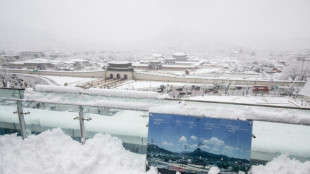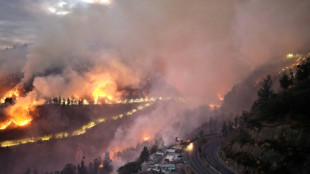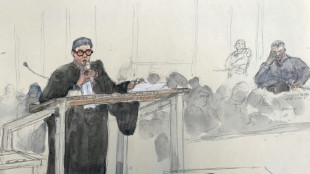
-
 South Korea officials say three dead in heavy snowfall
South Korea officials say three dead in heavy snowfall
-
High-flying Fiorentina face test of Scudetto credentials with Inter visit

-
 Verstappen switches focus to re-boot defence of F1 teams' title
Verstappen switches focus to re-boot defence of F1 teams' title
-
UK filmmaker Richard Curtis makes first foray into animation

-
 Countrywide air alert in Ukraine due to missile threat
Countrywide air alert in Ukraine due to missile threat
-
China's military corruption crackdown explained

-
 Primark boss defends practices as budget fashion brand eyes expansion
Primark boss defends practices as budget fashion brand eyes expansion
-
Williamson eyes ton as New Zealand take control against England

-
 Norway faces WWF in court over deep sea mining
Norway faces WWF in court over deep sea mining
-
Trump, Sheinbaum discuss migration in Mexico amid tariff threat

-
 Asian markets mixed after subdued pre-holiday shift on Wall St
Asian markets mixed after subdued pre-holiday shift on Wall St
-
Orban's soft power shines as Hungary hosts Israeli match

-
 'Retaliate': Trump tariff talk spurs global jitters, preparations
'Retaliate': Trump tariff talk spurs global jitters, preparations
-
'Anti-woke' Americans hail death of DEI as another domino topples

-
 Trump hails migration talks with Mexico president
Trump hails migration talks with Mexico president
-
Truckers strike accusing Wagner of driver death in Central African Republic

-
 London police say 90 victims identified in new Al-Fayed probe
London police say 90 victims identified in new Al-Fayed probe
-
Air pollution from fires linked to 1.5 million deaths a year

-
 Latham falls for 47 as New Zealand 104-2 in first England Test
Latham falls for 47 as New Zealand 104-2 in first England Test
-
US tells Ukraine to lower conscription age to 18

-
 Judge denies Sean Combs bail: court order
Judge denies Sean Combs bail: court order
-
Suarez extends Inter Miami stay with new deal

-
 Perfect Liverpool on top of Champions League, Dortmund also among winners
Perfect Liverpool on top of Champions League, Dortmund also among winners
-
Liverpool more 'up for it' than beaten Madrid, concedes Bellingham

-
 Aston Villa denied late winner against Juventus
Aston Villa denied late winner against Juventus
-
Mexico president hails 'excellent' Trump talks after US tariff threat

-
 Leicester set to appoint Van Nistelrooy - reports
Leicester set to appoint Van Nistelrooy - reports
-
Coffee price heats up on tight Brazil crop fears

-
 Maeda salvages Celtic draw against Club Brugge
Maeda salvages Celtic draw against Club Brugge
-
Villa denied late winner against Juventus

-
 Dortmund beat Zagreb to climb into Champions League top four
Dortmund beat Zagreb to climb into Champions League top four
-
Mbappe misses penalty as Liverpool exact revenge on Real Madrid

-
 Brazil's top court takes on regulation of social media
Brazil's top court takes on regulation of social media
-
Thousands still queuing to vote after Namibia polls close

-
 Trump taps retired general for key Ukraine conflict role
Trump taps retired general for key Ukraine conflict role
-
Canadian fund drops bid for Spanish pharma firm Grifols

-
 Argentine ex-president Fernandez gives statement in corruption case
Argentine ex-president Fernandez gives statement in corruption case
-
Mexico says Trump tariffs would cost 400,000 US jobs

-
 Car-centric Saudi to open first part of Riyadh Metro
Car-centric Saudi to open first part of Riyadh Metro
-
Brussels, not Paris, will decide EU-Mercosur trade deal: Lula

-
 Faeces, vomit offer clues to how dinosaurs rose to rule Earth
Faeces, vomit offer clues to how dinosaurs rose to rule Earth
-
Ruby slippers from 'The Wizard of Oz' up for auction

-
 Spain factory explosion kills three, injures seven
Spain factory explosion kills three, injures seven
-
US Fed's favored inflation gauge ticks up in October

-
 Defence lawyers plead to judges in French mass rape trial
Defence lawyers plead to judges in French mass rape trial
-
US says China releases three 'wrongfully detained' Americans

-
 New clashes in Mozambique as two reported killed
New clashes in Mozambique as two reported killed
-
Romania officials to meet over 'cyber risks' to elections

-
 Chelsea visit next stop in Heidenheim's 'unthinkable' rise
Chelsea visit next stop in Heidenheim's 'unthinkable' rise
-
Former England prop Marler announces retirement from rugby


Some defiant south Lebanese stay put in face of Israeli fire
Cattle farmer Khairallah Yaacoub refused to leave south Lebanon despite a year of Hezbollah-Israel clashes. When full-scale war erupted, he and four others were stranded in their ruined border village.
Yaacoub is among a handful of villagers in the war-battered south who have tried to stay put despite the Israeli onslaught.
He finally fled Hula village only after being wounded by shrapnel and losing half of his 16-strong herd to Israeli strikes.
On October 19, three weeks into Israel's escalated war against Hezbollah, members of a UN peacekeeping force in Lebanon rescued three of Hula's five remaining residents including Yaacoub.
They had been marooned by constant bombardment and with rubble-strewn access roads all but unpassable.
The two of the five remaining had no mobile phones and could not be located.
"I wanted to stay with the cows, my livelihood. But in the end I had to leave them too because I was injured," Yaacoub, 55, told AFP.
With no immediate access to a hospital, he had to remove the shrapnel himself using a knife to cauterise his wound and then apply herbal medicine to it.
"It was difficult for me to leave my house because warplanes were constantly circling above our heads and bombing around us," he said, describing weeks of sleepless nights amid intense strikes.
Now north of Beirut, Yaacoub said he dreams of returning home.
"When I arrived in Beirut, I wished I'd died in Hula and never left," he said.
"If there's a ceasefire, I will return to Hula that very night. I'm very attached to the village."
- 'Smoke shisha' -
On September 23, Israel began an air campaign mainly targeting Hezbollah strongholds and later launched ground incursions.
According to an AFP tally of health ministry figures, at least 1,829 people have been killed inside Lebanon since then.
The war has displaced at least 1.3 million people, more than 800,000 of them inside the country, the United Nations migration agency says.
Scarred by memories of Israel's occupation of south Lebanon, a few villagers have refused to leave, fearing they might never see their hometowns again.
On October 22, UN peacekeepers evacuated two elderly sisters, the last residents of the border village of Qawzah, to the nearby Christian village of Rmeish.
Christian and Druze-majority areas have remained relatively safe, with Israel mostly targeting Shiite-majority areas where Hezbollah holds sway.
AFP contacted half a dozen mayors, from the coastal town of Naqura near the border to Qana, about 20 kilometres (12 miles) away, who said villages and towns had been emptied.
But just a few kilometres north of Qana, Abu Fadi, 80, said he is refusing to leave Tayr Debba, a village Israel has repeatedly attacked.
"Since 1978, every time there's an invasion I come back to the village," said the retired south Beirut policeman who now runs a coffee stall in the shade of an olive tree.
"I smoke my shisha and stay put. I'm not scared."
- 'No torture' -
About 5,000 people used to live in Tayr Debba near the main southern city of Tyre, but now only a handful remain, he said.
"About 10 houses in our neighbourhood alone were damaged, with most completely levelled," Fadi said.
"I have long been attached to this house and land."
But he "felt relieved" his nine children and 60 grandchildren -- who repeatedly beg him to leave -- were safe.
Bombs are not the only danger southern Lebanese face.
Israeli soldiers detained a man and a nun in two border villages before releasing them, a Lebanese security official told AFP.
Ihab Serhan, in his sixties, lived with his cat and two dogs in Kfar Kila until soldiers stormed the village and took him to Israel for questioning.
"It was a pain, but at least there was no torture," he told AFP.
He was released about 10 days later and questioned again by the Lebanese army before being freed, he said.
A strike destroyed his car, stranding him without power, water or communications as his village became a battlefield.
"I was stubborn. I didn't want to leave my home," Serhan said.
His late father dreamt of growing old in the village, but died before Israel ended its occupation of the south in 2000, and did not return.
Now the family home has been destroyed.
"I don't know what happened to my animals. Not a single house was left standing in Kfar Kila," Serhan said.
N.Fournier--BTB
